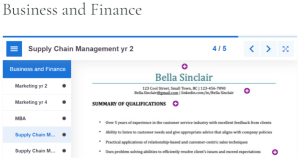A common question we receive from students is how their resumes should look for certain industries or for their specific program. It’s a great question because it lets us work with students on targeting their resumes to industries, fields, postings, and differing expectations about what should be included in a resume.
Last year, when we reviewed the resume examples we provide to students, we identified that the examples tend to focus on generally accepted resume formatting and lacked the conventions expected in a field such as computer science or trades. Instead, that information was left to one-on-one appointments or presentations.
As most professional career educators can appreciate, locating sample resumes and verified information for specific employment sectors can be nearly impossible due to the lack of open-source samples that aren’t restricted to a single organization or institution or locked behind membership, tuition or user fees. Previously, many practitioners, including our team, accessed online resume banks from other institutions, but we found more and more of them were out of date, lacked the visual appeal or standards HR professionals were looking for or were no longer accessible to the general public.
As career educators at Thompson Rivers University, we use resume examples both in one-on-one meetings with students as well as when teaching workshops and credit classes. Solving this problem is why we decided to create a Resume Catalogue that is accessible and is shareable to practitioners, clients and learners to explore application document samples across a wide variety of industries. The result is an Open Educational Resource (OER) that provides free, unrestricted access to resume resources and samples.

The Team at TRU’s Career & Experiential Learning Department was already engaged in writing a Career Management Textbook, edited by TRU’s Jamie Noakes, as an Open Educational Resource (OER). The textbook will be coming out in late 2022. While writing the application documents section, one of our team members identified the lack of sector-specific examples as a problem with what we were currently offering and with what was publicly available to students. From that was born the Sector Specific Resume Project, which aimed to build an expansion to the textbook that could stand on its own and guide students as they learn the conventions of resume writing.
We applied for and received an Open Educational Research Grant from Thompson Rivers University, which allowed us to expand our project beyond simply a departmental resource or an appendix to the textbook. We were able to investigate industry best practices and to identify the technology required to share the resources with a wider range of users beyond our university that could also benefit from this shared resource.
A fundamental goal of the research was to validate many of the key messages and consistent themes of resume development guidance provided to students in courses and advising appointments such as avoiding overused online templates, specific formatting errors and common HR preferences. We hope for this resource to be usable by both students and career professionals across Canada. It has also been a comprehensive exercise in validating and verifying resume examples by hiring managers and employers in each of the relevant sectors.
Highlighting the need for sector-specific information originating directly from those that hire for and within the selected industry types, the research team worked closely with industry professionals and hiring managers to identify key skills and achievements that would be relevant for successful candidates in each of the employment areas. To create enriching opportunities for collaboration and work-integrated learning, a Student Research Assistant was onboarded to provide technical support for the development of the OER platform and add a student perspective to the project.

We decided to focus on the following sectors in the first round of development:
- Business & Accounting
- Marketing & Public Relations
- Humanities & Social Sciences
- Computing & Information Technology
- Lab and Field Sciences
- Construction Trades
We also determined that the resumes would not be based on high-quality anonymized student resumes – a common practice in post-secondary career development. Instead, we created new documents based on wholly fictitious students to ensure original content.
TRU Career & Experiential Learning Department faculty members and subject matter experts developed two sample resumes for each sector: one representing common student achievements mid-academic program and another for graduating students. We engaged an employer focus group of diverse HR professionals to verify the resumes and the knowledge gained earlier in consultation with subject matter experts, adding credibility to the industry samples.
The final version of the Resume Catalogue includes images of the resumes created with “hot spots” where users can click on targeted areas of a sample to view more detailed information and instructions on specific resume sections for a deeper dive on content development. It also includes a short section with information on modern resume formatting to guide users.
These resources are designed to be used in career management courses and in one-on-one career advising appointments. We are excited to have developed this as an Open Educational Resource because it provides us the ability to continuously evolve and improve the content.
The next phase of this project will be to add additional sector samples for Education, Graphic Communications, Transportation Trades and Information Technology as well as incorporate cover letter samples to supplement the Resume Catalogue and further align the catalogue with the OER Career Management Textbook.
In the spirit of Open Education, we sincerely hope that many other teams can incorporate these tools into their practice as they continue to support the career success of others.




